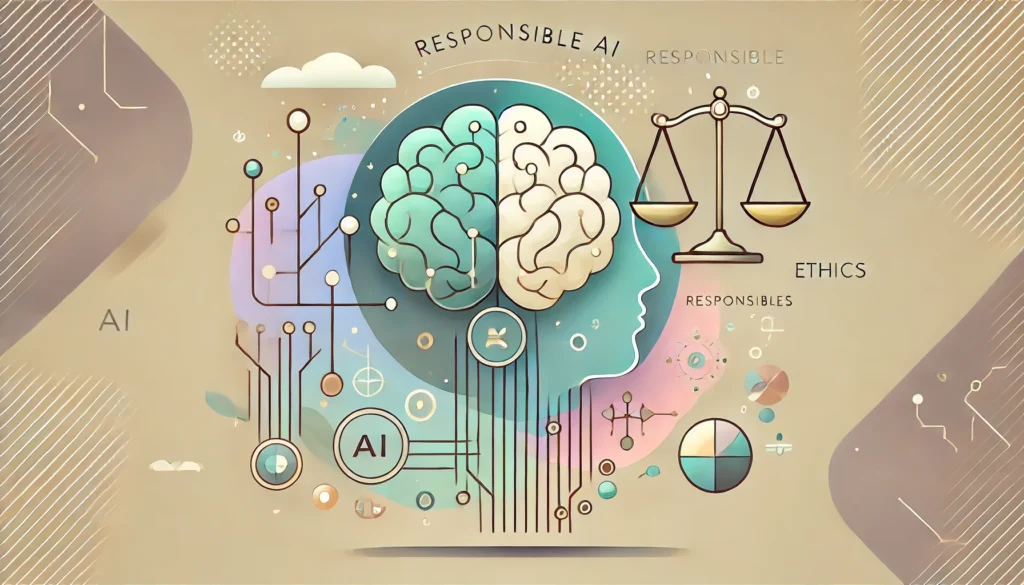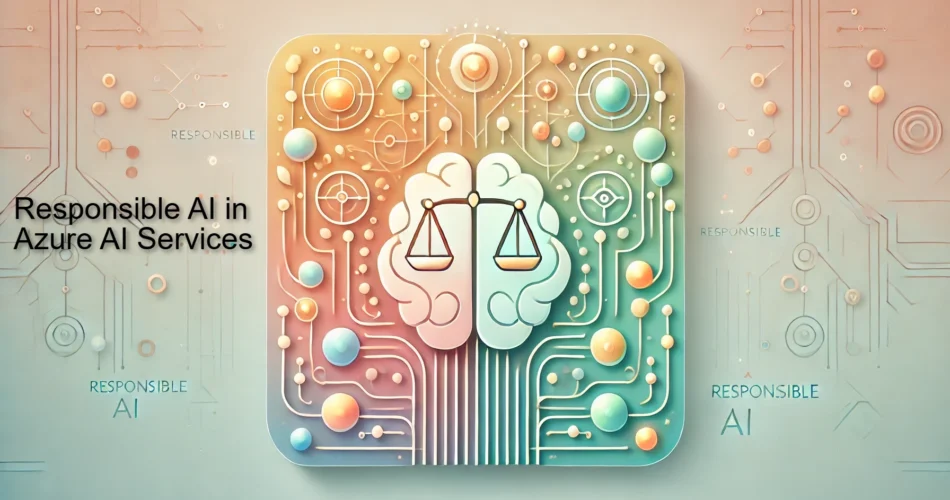In the age of artificial intelligence, the ethical usage of AI systems is more urgent than ever. Responsible AI practices refer to designing, developing, and deploying ethical, trustworthy AI systems that respect societal values, emphasizing transparency, accountability, and fairness, hence free from bias and discriminatory results. Responsible AI aims to protect privacy and user rights while promoting inclusivity across diverse communities. The use of AI technologies in ways that promote the public good, minimize harm, and enhance societal well-being is fundamental to building public trust and confidence in these systems. Continuous monitoring and regulation are also necessary to adapt to emerging challenges and maintain ethical standards over time.
What is Responsible AI?
Responsible AI is a way of designing, developing, and deploying artificial intelligence systems in a manner that ensures they are ethical, fair, and aligned with human values; it ensures the creation of AI systems that benefit everyone without causing harm or perpetuating biases. This practice is taken very seriously because this is the only way AI technologies can be used responsibly and ethically in the various fields.
Why is it important in modern AI solutions?
AI systems have a bearing on major decisions in healthcare, finance, education, and many more. Ensuring that these systems are responsible prevents unintended consequences such as bias, privacy violations, or misuse. Responsible AI builds trust and ensures that the technology is used for positive impact, contributing to the overall well-being of society. It also promotes equality by ensuring the AI systems used are accessible and fair to everyone, regardless of their background or identity.
Microsoft’s commitment to Responsible AI:
Microsoft is a leader that promotes Responsible AI. They established guiding principles and developed tools for resources to make AI systems trustworthy, secure, and inclusive. Their Responsible AI Standard helps organizations bring their AI projects in line with ethical practices. It provides frameworks for transparency, accountability, and fairness in the development and deployment of AI. The efforts by Microsoft are aimed at making sure that solutions developed with AI contribute to the public good and avoid causing harm.
Microsoft’s Responsible AI Principles
- Fairness: Eliminating bias and promoting equity in AI systems. Microsoft aims to design AI solutions that work well for all demographic groups and avoid discrimination, ensuring that AI outcomes are not skewed by unintentional biases.
- Inclusivity: Making AI accessible to everyone. This means developing AI systems that are usable by diverse groups, including those with disabilities or underrepresented communities, so that no group is left behind in the benefits of AI advancements.
- Privacy and Security: Safeguarding user data and robust protection against threats. Microsoft ensures that AI systems comply with strict privacy regulations, such as GDPR, and are resistant to cyberattacks. It prioritizes data protection and confidentiality of the user.
- Transparency: Clearly and accurately explain how AI systems work. This principle will help users understand AI processes and decisions, offering insight into how data is used and how conclusions are drawn, thereby fostering trust in AI systems.
- Accountability: Humans at the helm of AI results. AI systems are designed to be an extension of human decision-making and not a replacement, with clear accountability mechanisms in place. Microsoft stresses that human responsibility is still the ultimate end for AI decision-making, and ethical oversight remains intact throughout the AI lifecycle.
How Azure AI Integrates Responsible AI
Azure AI embodies the principles of Responsible AI by providing tools and frameworks designed to address the ethical challenges that help organizations build trustworthy AI systems.
Fairness Tools: Azure includes tools like Fairlearn to detect and mitigate bias in AI models. This helps developers ensure that their AI systems make fair and equitable decisions across different demographic groups, reducing the risk of biased outcomes.
Explainability: Tools like InterpretML make AI systems more understandable to developers and users by providing insights into how AI models arrive at their decisions. This transparency ensures that users can trust and comprehend the processes behind AI outcomes, fostering accountability.
Ethical AI Usage: Azure AI Content Safety ensures that AI applications adhere to ethical standards by monitoring and filtering harmful content. This tool is essential for preventing misuse and ensuring that AI technologies are used responsibly.
Real-World Applications
Organizations across industries use Azure AI to implement Responsible AI, ensuring that AI systems contribute positively to society:
- Healthcare: Healthcare systems use Azure AI to make unbiased diagnostic decisions, enhancing the accuracy and fairness of medical outcomes for all patients.
- Finance: Financial institutions rely on Azure AI to ensure fair lending practices through transparent AI models, helping to reduce discriminatory practices and promote equal access to financial services.
These applications demonstrate how Azure AI tools support ethical practices while driving innovation and positive impact across diverse sectors.

Responsible AI is not just about building ethical systems; it’s about creating technology that aligns with human values, fosters trust, and benefits society as a whole.
Tools and Features for Responsible AI
Fairlearn
Fairlearn assists developers in detecting and mitigating biases in machine learning models so that the outcome can be fair. It offers visualizations of fairness metrics and methods like re-weighting and constrained optimization to solve disparities between groups of people and ensure more equal AI systems.
InterpretML
InterpretML adds transparency to the AI model, providing tools that explain how an AI model decides. It supports both global and local interpretability, allowing developers and users to understand the behavior of models, identify biases, and trust AI-driven outcomes in responsible and ethical use of machine learning.
Azure AI Content Safety
Azure AI Content Safety helps ensure ethical usage by detecting and managing harmful content in AI-powered applications. It offers real-time content moderation tools to filter hate speech, explicit language, and other harmful materials, enabling organizations to create safer environments and comply with ethical standards.
Differential Privacy
Differential Privacy provides privacy over individual data points, protecting them from identification. Using noise techniques, it enables the analysis of data without violating user confidentiality, thereby enabling businesses to remain private while extracting insights and fulfilling data protection regulations.
Cognitive Services Transparency Notes
Cognitive Services Transparency Notes are clear and well-documented responsible API usage. They enlighten developers as to how an AI model operates and the reasons behind its decision-making process in terms of the ethical considerations associated with it.
Success Stories
Organizational examples that have adopted Responsible AI in Azure:
In health care, retail, and education sectors, the organizations implement Azure AI responsible AI tools. It helps organizations align their AI with principles such as fairness, privacy, and transparency, therefore allowing trust and responsible use of technology across different sectors.
Success stories showcasing fairness, privacy, and transparency:
- A healthcare provider used Fairlearn to reduce bias in patient diagnosis systems, ensuring that AI models make equitable decisions for diverse patient populations, improving diagnostic accuracy and outcomes for all.
- An e-commerce platform adopted InterpretML to explain product recommendations to customers, providing transparency into how the AI suggests products and helping users make informed decisions, while also fostering trust in the platform’s AI.
- A social media platform implemented Azure AI Content Safety to moderate harmful content effectively, ensuring that AI-driven content moderation aligns with ethical standards and community guidelines, creating a safer environment for users.
Best Practices for Implementing Responsible AI
Steps to align AI solutions with Microsoft’s Responsible AI principles:
- Define ethical goals: Establish clear, well-defined ethics guidelines that should align AI projects with fairness, transparency, and accountability.
Use Azure tools to ensure fairness and transparency in the AI models that are being built. Tools such as Fairlearn and InterpretML can be applied during development. - Use Azure tools: Leverage tools like Fairlearn and InterpretML during development to ensure fairness and transparency in AI models.
Importance of diverse datasets and inclusive development teams:
- Ensure diverse datasets: Use representative datasets that include all demographic groups to prevent bias.
- Include diverse teams: Involve team members from different backgrounds to identify potential biases and improve model fairness.
Monitoring and improving AI systems over time:
- Evaluate models continuously: Regularly assess AI models for fairness and accuracy to detect and address issues early.
- Update based on feedback: Continuously update models with new data and feedback to maintain fairness and effectiveness.
Explore the tools and resources available in Azure AI to integrate Responsible AI practices into your projects. Learn more about Microsoft’s commitment to Responsible AI here.
By adopting Responsible AI, we can ensure that technology remains a force for good, benefiting everyone in society.
